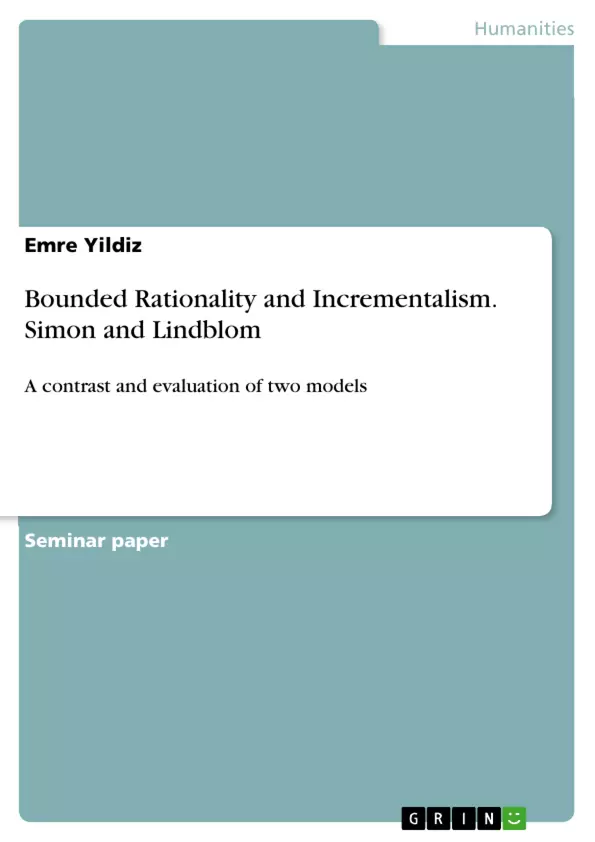Agreeing with the notion that public policies are “whatever governments choose to do or not to do” (Dye, 1987, p. 1) eventuates in breaking down the academic field of public policy to the study of decision making. Whether public policy is indeed in its essence the study of decision making or not is however part of a different debate that this essay will not delve into. Nevertheless, noteworthy here is that questions such as 'who are the decision makers? How and why do they take the decisions they are taking?' have been leading research questions in public policy sciences. One theoretical framework policy scholars have long used to give answers to the questions was the rational choice theory.
(...)
Inhaltsverzeichnis (Table of Contents)
- Introduction
- Bounded Rationality and Incrementalism
- Simon and His Theory of Bounded Rationality
- Lindblom and His Theory of Incrementalism
- Comparison
- Contrasting Bounded Rationality with Incrementalism
- Empirical Value of Bounded Rationality and Incrementalism
- Conclusion
- Perspectives: Criticism and Further Research
Zielsetzung und Themenschwerpunkte (Objectives and Key Themes)
This essay aims to introduce Simon's theory of "bounded rationality" and Lindblom's concept of "incrementalism" as alternative models of decision-making in public policy. It compares and contrasts these models, examining their commonalities and distinctions. Finally, it critically evaluates the degree to which Simon and Lindblom's approaches are grounded in reality.
- Bounded rationality as a model of decision-making
- Incrementalism as a model of decision-making
- Comparison and contrast of bounded rationality and incrementalism
- Empirical value and limitations of both models
- Critical evaluation of Simon and Lindblom's approaches
Zusammenfassung der Kapitel (Chapter Summaries)
The first chapter introduces the essay's objectives and provides background information on the rational choice theory, which is contrasted with Simon and Lindblom's models. The second chapter focuses on Simon's theory of bounded rationality, highlighting its core arguments and explaining why complete rationality is impossible to attain. The third chapter delves into Lindblom's model of incrementalism, presenting his core argument that decision-makers tend to make small, incremental changes to existing policies. The fourth chapter compares and contrasts bounded rationality and incrementalism, examining their similarities and differences.
Schlüsselwörter (Keywords)
Key terms and concepts explored in this essay include bounded rationality, incrementalism, public policy, decision-making, rational choice theory, cognitive limitations, environmental constraints, and policy analysis.
Frequently Asked Questions
What is Herbert Simon's theory of "bounded rationality"?
Bounded rationality is the idea that in decision-making, individuals are limited by the information they have, the cognitive limitations of their minds, and the finite amount of time they have to make a decision.
How does Lindblom's "incrementalism" differ from rational choice?
Unlike rational choice, which seeks the optimal solution through exhaustive analysis, incrementalism suggests that policy makers make small, cautious changes to existing policies based on what is socially and politically feasible.
Why is complete rationality impossible in public policy?
Complete rationality is impossible due to environmental constraints, the complexity of social problems, and the human inability to process all possible outcomes and alternatives simultaneously.
What are the commonalities between Simon and Lindblom's models?
Both models reject the "rational-comprehensive" ideal and emphasize that real-world decision-making is messy, constrained by human limits, and focused on "satisficing" rather than maximizing.
What is the empirical value of these decision-making models?
These models are considered more realistic than rational choice theory because they accurately describe the actual behavior of government officials and organizations in the policy-making process.
- Quote paper
- Emre Yildiz (Author), 2013, Bounded Rationality and Incrementalism. Simon and Lindblom, Munich, GRIN Verlag, https://www.grin.com/document/231990



